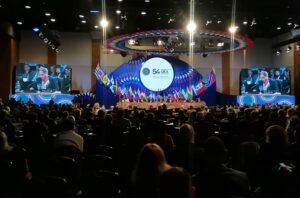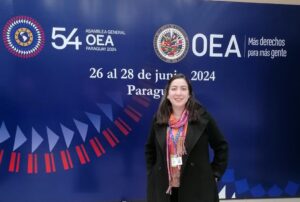
The General Assembly is the principal decision-making body of the Organization of American States (OAS), composed of the member states of the Americas. It meets annually to discuss and formulate policies on important issues affecting the region, and its main purpose is to strengthen peace, security and democracy and promote economic and social development in the region.
In 2024, the 54th OAS General Assembly was held on June 26-28 in Asuncion, Paraguay to address various critical issues, including protecting human rights, democracy and security.
IIRF Program Officer, M.A. Marcela Bordón, participated in the General Assembly as part of civil society actors representing the IIRF and the Foundation Platform for Social Transformation. Bordón met with representatives of OAS member states and civil society organizations to present the work done by the IIRF in promoting religious freedom and protecting democracy and human rights.
At the General Assembly, the third edition of the Interreligious Forum of the Americas was held. a space where religious leaders from the different religious communities of the region seek to generate spaces for dialogue and to bring together individuals and faith-based organizations that address the problems and hope to be part of the solution to the problems faced by the people and nations of the region.
This forum explored “Interreligious cooperation as a path to peace” and brought together for the first time many officials from various ministries of religious affairs and countries from the Americas. Religious leaders, NGO leaders, academics, diplomats and representatives of indigenous spiritualities participated. IIRF representative Bordón also participated in the forum and shared IIRF findings with different religious and social actors in the framework of the interreligious forum.
This important event culminated in the approval of a series of resolutions, among which the resolution on the “Promotion and Protection of Human Rights” included a section on “Strengthening the Protection and Promotion of the Right to Freedom of Conscience and Religion or Belief,” which highlights the commitment of member states to the protection of freedom of religion and belief.
The resolution expresses concern over continuing acts of discrimination and the rise of hatred towards various religions, such as Judaism, Islam, Christianity, and African or Indigenous religions. The forum and resolution condemn all forms of intolerance and religious violence and reaffirm the need to protect places of worship, religious, and or cultural sites by recognizing that their destruction undermines the right to religious freedom.

To advance the protection of these rights, the resolution requests that the Inter-American Commission on Human Rights (IACHR) present a study on freedom of conscience and religion in the Americas and initiate a dialogue with OAS member states. Member states should 1) establish inclusive mechanisms and public policies to promote religious pluralism and tolerance and 2) eliminate religious discrimination, especially against marginalized groups.
In addition, the organization of events and conferences to promote respect for freedom of conscience and religion is encouraged. The forum also acknowledges that reports on best practices for protecting places of worship and sacred sites, including those of indigenous peoples, will be necessary for educational purposes. You can read the resolutions here.
The OAS General Assembly resolution represents an important step toward the consolidation of religious freedom in the Americas. However, its success will depend on the willingness and ability of member states to implement the agreed upon recommendations and commitments.
For example, the Observatory for Religious Freedom in Latin America has pointed out that, although significant progress has been made, important challenges remain. One of the problems mentioned is the lack of precision in the Inter-American standards on freedom of religion and belief, which can lead to inaccuracies and omissions in their implementation. The Observatory stresses the need for greater clarity and uniformity in the interpretation and application of these standards to ensure effective protection of religious rights throughout the region. We invite you to read OLIRE’s analysis of the latest Inter-American Religious Freedom Standards study by the IACHR here.

Regarding the event and forum, Bordón surmises that “The participation of IIRF in these spaces is key to establishing ourselves as a reference in the study and promotion of religious freedom in the region. Unfortunately, what is observed in most countries and organizations in the region is the lack of religious literacy and an understanding of the multidimensionality of religious freedom. We have received a good reception from the permanent missions to the OAS and look forward to cooperating more closely with governments and the OAS in promoting religious freedom in the Americas.”